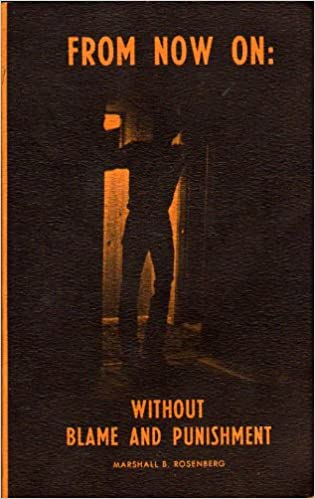This is the title of Marshall B. Rosenberg’s first booklet on a way of communicating that helps us if we want to connect to a spiritual level of experience. I understand the term “Life’s Sweet Flow” was later replaced by “needs”. The booklet was published on January 1, 1976.
The most radical tenet of his teaching, as he latere said himself, became “Do not do anything unless it’s play.” When we try to live according to this intention, most of us will end up changing how we spend our daily lives a lot.
Marshall Rosenberg found out that in order to live a spiritual life where one feels at one with the body and the mind, in the here and the now, it helps to know what the intention behind our actions and thoughts is.
“I’ve learned that I am more likely to make contact with Life’s Sweet Flow when I’m doing whatever I’m doing because it’s fun or because I see the act contributing to the welfare of others or myself. I don’t enjoy living as much when I’m doing what I’m doing to avoid blame or punishment.”
Am I acting from a sense of fear or am I acting from a sense of joyful and willing contribution?
And what helps to live in this consciousness?
Marshall Rosenberg found out that a particular kind of honesty helps:
“Therefore, I have been developing ways of thinking about and communicating with myself and others that enable me to live without blaming or punishing myself or others. This book is about these ways of thinking and communicating. I have found that when I am honest with myself I have no desire to blame or punish others.”
So honesty is a helpful anti-dote to our tendency or habit to blame or punish, he found out. But what exactly he means when he talks about this particular kind of honesty?
“I use the term ‘honest with myself’ to refer to my ability and willingness to identify at any given moment:
- what I’m reacting to,
- how I feel,
- what I’m telling myself that makes me feel as I do,
- and what I want to happen.”
So this is one of the precursers of the “Four Steps of Nonviolent Communication” – which later became OFNR – or Observation, Feeling, Need, Request. This is most interesting to digest and take in.

In chapters Two through Five I will describe how I am developing this ability to be honest with myself.
I have also found that when I empathize with others I have no desire to blame or punish them. I use the term ‘empathize with others’ to refer to my ability to understand to their satisfaction at any given moment what they are reacting to, feeling, telling themselves that makes them feel as they do, and wanting to happen. This will be the subject matter of Chapter Six.
In Chapter Seven I will outline some ways of preventing, detecting, and correcting misinterpretations that might result from being honest and empathic in the ways I advocate.
Chapter Eight discusses some differentiations I have made in my thinking about the use of force which help me avoid punitive action.
In Chapters Nine, Ten and Eleven I will then discuss some applications of being honest with oneself and empathic with others in conflict situations.
If you would like to test your ability to understand the skills discussed in Chapters Two through Six, I have included some exercises in the Appendix.”
Source of this information:
https://www.amazon.com/Now-Marshall-B-Rosenberg/dp/B0006XLXMU
Rosenberg, Marshall B. FROM NOW ON: WITHOUT BLAME AND PUNISHMENT, 1977.
(Author’s address: 3229 Bordeaux, Sherman, TX 75090, 21* 1/893-3886, $3.50.)
A personal approach to the skills of giving feedback and criticism in a way that promotes cooperation rather than conflict. Makes a persuasive statement about applying these techniques in all relationships.
